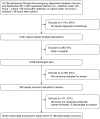Association between Adherence to Recommended Care and Outcomes for Adult Survivors of Sepsis
- PMID: 31644304
- PMCID: PMC6944350
- DOI: 10.1513/AnnalsATS.201907-514OC
Association between Adherence to Recommended Care and Outcomes for Adult Survivors of Sepsis
Abstract
Rationale: Postsepsis care recommendations target specific deficits experienced by sepsis survivors in elements such as optimization of medications, screening for functional impairments, monitoring for common and preventable causes of health deterioration, and consideration of palliative care. However, few data are available regarding the application of these elements in clinical practice.Objectives: To quantify the delivery of postsepsis care for patients discharged after hospital admission for sepsis and evaluate the association between receipt of postsepsis care elements and reduced mortality and hospital readmission within 90 days.Methods: We conducted a retrospective chart review of a random sample of patients who were discharged alive after an admission for sepsis (identified from International Classification of Diseases, 10th Revision discharge codes) at 10 hospitals during 2017. We used a structured chart abstraction to determine whether four elements of postsepsis care were provided within 90 days of hospital discharge, per expert recommendations. We used multivariable logistic regression to evaluate the association between receipt of care elements and 90-day hospital readmission and mortality, adjusted for age, comorbidity, length of stay, and discharge disposition.Results: Among 189 sepsis survivors, 117 (62%) had medications optimized, 123 (65%) had screening for functional or mental health impairments, 86 (46%) were monitored for common and preventable causes of health deterioration, and 110 (58%) had care alignment processes documented (i.e., assessed for palliative care or goals of care). Only 20 (11%) received all four care elements within 90 days. Within 90 days of discharge, 66 (35%) patients were readmitted and 33 (17%) died (total patients readmitted or died, n = 82). Receipt of two (odds ratio [OR], 0.26; 95% confidence interval [95% CI], 0.10-0.69) or more (three OR, 0.28; 95% CI, 0.11-0.72; four OR, 0.12; 95% CI, 0.03-0.50) care elements was associated with lower odds of 90-day readmission or 90-day mortality compared with zero or one element documented. Optimization of medications (no medication errors vs. one or more errors; OR, 0.44; 95% CI, 0.21-0.92), documented functional or mental health assessments (physical function plus swallowing/mental health assessments vs. no assessments; OR, 0.14; 95% CI, 0.05-0.40), and documented goals of care or palliative care screening (OR, 0.52; 95% CI, 0.25-1.05; not statistically significant) were associated with lower odds of 90-day readmission or 90-day mortality.Conclusions: In this retrospective cohort study of data from a single health system, we found variable delivery of recommended postsepsis care elements that were associated with reduced morbidity and mortality after hospitalization for sepsis. Implementation strategies to efficiently overcome barriers to adopting recommended postsepsis care may help improve outcomes for sepsis survivors.
Keywords: hospital readmission; mortality; sepsis; survivorship; transitional care.
Figures
Comment in
-
Passing the Baton: Improving Postsepsis Care through Better Transitions.Ann Am Thorac Soc. 2020 Jan;17(1):35-37. doi: 10.1513/AnnalsATS.201910-779ED. Ann Am Thorac Soc. 2020. PMID: 31891303 No abstract available.
References
-
- Fleischmann C, Scherag A, Adhikari NK, Hartog CS, Tsaganos T, Schlattmann P, et al. International Forum of Acute Care Trialists. Assessment of global incidence and mortality of hospital-treated sepsis. current estimates and limitations. Am J Respir Crit Care Med. 2016;193:259–272. - PubMed
-
- Rhodes A, Evans LE, Alhazzani W, Levy MM, Antonelli M, Ferrer R, et al. Surviving Sepsis Campaign: international guidelines for management of sepsis and septic shock: 2016. Intensive Care Med. 2017;43:304–377. - PubMed
-
- Kaukonen KM, Bailey M, Suzuki S, Pilcher D, Bellomo R. Mortality related to severe sepsis and septic shock among critically ill patients in Australia and New Zealand, 2000-2012. JAMA. 2014;311:1308–1316. - PubMed
Publication types
MeSH terms
LinkOut - more resources
Full Text Sources
Medical


